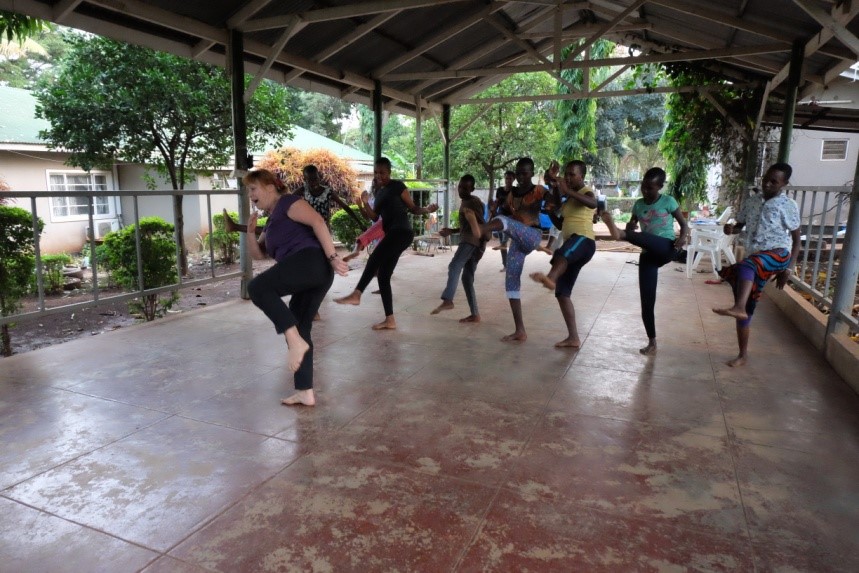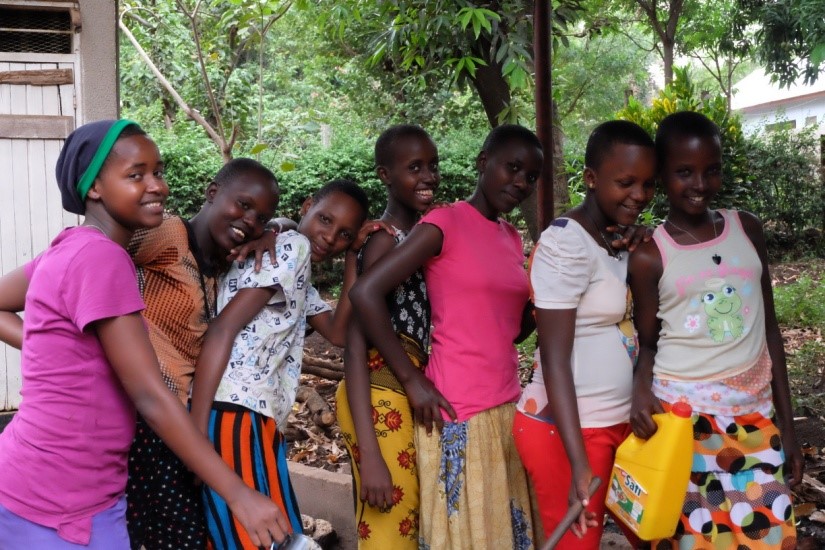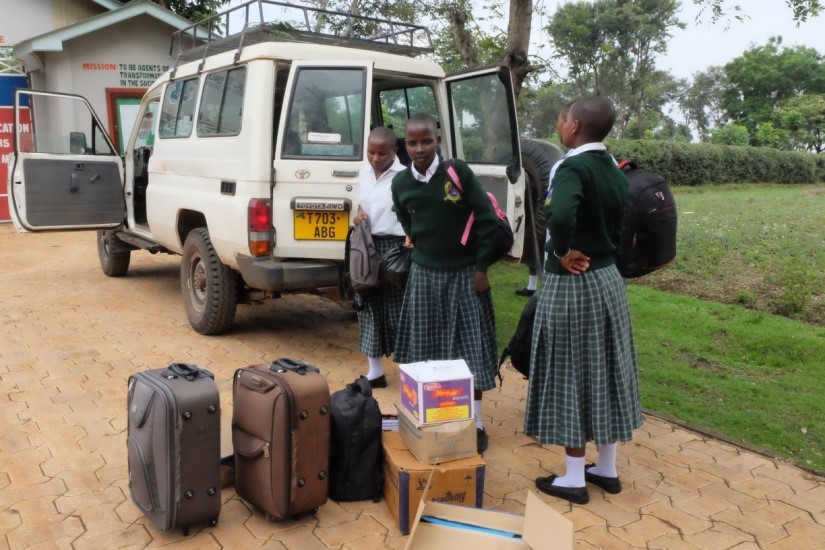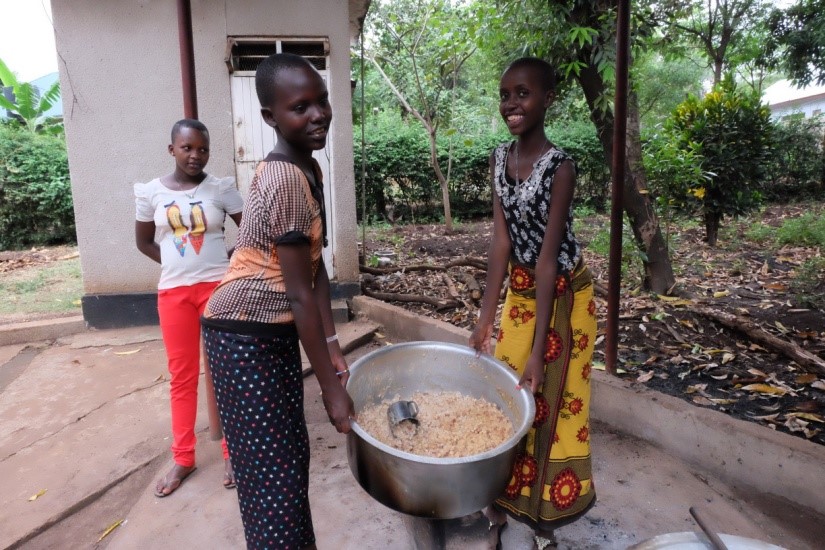Dreams come true with empowered girls
At present, 52 Maasai girls between the age of eight and twenty-seven years are entrusted to the care of the NAFGEM shelter house in Moshi (Tanzania). They all have their individual stories to tell, but they share one common disturbing experience: They were meant to get married at a very young age and had to undergo FGM (female genital mutilation) in preparation for their marriage. Most of the girls started going to school at a younger age, but their situation became increasingly difficult when they began to approach the age when they were considered mature enough for marriage by their parents – which can be as early as the age of eight. However, they were struggling even before that as in traditional Maasai society girls are not supposed to receive any education. Rather, educating girls is seen as a waste of time and money as they are meant to be married off to earn their family the bride price. Apart from the fact that most families are struggling to procure enough money to pay for school and examination fees, they are also unwilling to invest in their daughters’ education. And even though some girls say that they were supported by their mothers and/or grandmothers, these women could not change the girls’ fate as women in traditional Maasai society have neither any of their own money at their disposal nor any decision-making authority whatsoever. Therefore, for these girls the only chance to escape child marriage and realize their dream of a self-determined life is to escape the harmful environment of their communities by staying in the safety of the NAFGEM shelter house. There – with the kind support of the sponsors – they are given the opportunity to attend school and complete their vocational training in peace.
Here are some of the girls’ stories:
J. was living with her mother and sister. With her father having passed away, J.’s elder brothers from her father’s first wife were making decisions for the family. Although her mother supported her in her wish to go to school, she was struggling to raise enough money for the school fees. Her brothers, on the other hand, refused to pay the fees for her as they would rather see her married; so, they kept her busy at home. Often, she was only able to attend school once a week; and, when she did, she ended up doing her homework late at night after finishing her household chores.
When her brothers were about to marry off her sister, both girls ran away. However, her sister was caught by the brothers and brought back home. In her desperation, she swallowed poison; fortunately, she was rescued by the mother who took her back to her home. J. managed to escape her brothers and with the help of another woman reached the police station where she reported her situation. The police then contacted NAFGEM requesting a safe place in the Moshi Safe Shelter for J.
Although J. says she was well aware her brothers were acting against the law when they wanted to marry off the two underage girls, and despite the moral support from her mother, she felt very desperate because she knew they, as women, could not change the decisions of men.
“At home I felt really, really bad”, J. says. So, although it was hard for her to leave her mother and sister behind, she felt very happy when she finally arrived at the police station and was brought to NAFGEM.
J. has been living with NAFGEM for eight years. With the support of the sponsors she is now receiving her education at a boarding school and feels very grateful for being able to attend school regularly and study in peace.
“In school there is enough time to study and discuss topics with others. I like being together with students from so many different regions because we can learn a lot from each other.”
Her favourite subjects are Biology, History, Civics and Languages. Later she wants to work as a civil worker and advise people in a bank.
After completing her education, J. also plans to return to her village, but – as she underlines – not to sit around but to bring about change in her community. She also strongly believes that Maasai men will eventually change their attitudes towards FGM and child marriage. Moreover, she stresses that the key to changing people’s minds is education: education in general but also and in particular about the harmful physical and mental consequences of FGM and child marriage. For the time being, the situation is still difficult, she says, because it’s hard to break up deeply-ingrained traditions. Admittedly, her brothers leave her alone now when she comes home for holidays, but – as she points out – they have changed their attitudes only seemingly: They know they will go to jail if they try to marry her off.
J. says she is feeling very sad about the many girls who still are in the villages experiencing violations of their human rights, especially now in June and in December when most of the mutilations take place. So, she tries to inform the girls in her village about NAFGEM, but every time she returns home she finds that some of them are no longer there as they have been married off to some other village. Girls are usually married off at the age of ten or twelve years and are sent with their husbands to live in remote villages where they don’t know anybody at all, often starting their lives there as one of several wives.
J. is very grateful for having the opportunity to stay with NAFGEM. She feels very much supported here and appreciates the fact that there is always someone there who will listen to the girls’ thoughts and worries. She says they learn a great deal about life which they weren’t aware of before and which will help them to live on their own later. She says that she hopes many more girls will get the chance to benefit from this supportive environment to give their lives a new perspective.
***

M. and K. who have arrived at the Safe Shelter in Moshi only recently were both attending Standard 6 of primary school. However, they both explain that classes in school were becoming increasingly difficult. As girls in Maasai society are not supposed to go to school, they received no support at home whatsoever. Rather than being able to concentrate on their studies after school, they had to help their parents with household chores before they could turn to their homework. Usually this was not before 9:30 p.m. or even 10:30 p.m. when they were tired from a long day and didn’t have any proper light to work in – actually they were using the glow from their mobile phones to study. Also, in the mornings they were supposed to complete their duties first before they were allowed to set off to school; very often they didn’t get there in time. In addition to the fact that they hardly ever managed to do all the exercises they were given by their teachers and missed classes regularly, they always attended classes over-fatigued, which meant they struggled to keep up during lessons.
Both girls tell they were aware of their rights, i.e. that FGM and child marriage are prohibited by law in Tanzania, and K. had even attended a presentation by the NAFGEM staff at school. Still they felt very desperate about their situation because knowing about their rights did not help them in the least to avert their fate. They therefore decided to tell their teacher about the imminent marriages – actually in both cases the bride price had already been paid. It was this teacher who told them about the NAFGEM Safe Shelter and took them (to) the police station.
“I don’t have a bad conscience because I left my family; they were doing bad things to me.” (K.)
Of course, they were leaving their families with mixed feelings because they knew they were leaving them with all the work at home and did not know how their families and the community would react. But still they felt very happy to escape the harmful environment of their homes. They knew this was their only chance to escape marriage and lead independent lives.
“At the shelter house we feel safe. We can live in peace and nobody is disturbing us. We have time to play and laugh, and sometimes we feel happy.” (M. and K.)
Like J. they highly appreciate the company of other the girls who have gone through the same disturbing experiences.
Now they are looking forward to going to school again. Their favourite subjects are Maths and Science for K. and Maths and Civics for M. They both dream of becoming an accountant or maybe an engineer later. They both feel confident they can reach these goals; they say if they only study hard enough they can achieve anything they want. Good jobs will enable them to lead independent lives, and they hope someday even their parents will be proud of them when they realize that also girls are capable of succeeding.
Both girls see themselves as models for other girls in their communities because they can spread the message about NAFGEM and encourage them to follow their example. However, they also stress that for many girls the situation is still very difficult. Many of them do not dare to reveal their hardships to their teachers for fear of being overheard and punished at home. Moreover, it is very difficult to get a place in the Safe Shelter due to the lack of capacity and resources. Therefore, they would like to encourage sponsors to continue their support to open up a new perspective for more girls who are still experiencing hardships in their communities.
***

G. tells her parents were quarrelling about her education. Her mother wanted her to continue school, whereas her father was against it. One day G. returned from school to find that her parents had separated and her father had already left the family.
Although she could set aside some time for studying, she couldn’t concentrate on it because her mind was occupied worrying about the imminent marriage. Also, in her case the parents had already received the bride price (i.e. sugar, soda, cows).
In school she got the opportunity to attend a presentation by NAFGEM and asked them for help. Although she knows her parents strongly dislike her leaving home, she says she feels very happy about being able to stay in the safety of the shelter house now. She has already applied to go to school again and will probably start in October. In the meantime, she is undertaking a computer course organized by NAFGEM. G. is especially fond of Geography and wants to work with animals or in a nature reserve when she is older.
“At home I felt very sad about my future and prayed to God every day to help me. I am so grateful that he did.”
She strongly believes that her parents will eventually change their minds when they see how she is succeeding with her education. She is sure that one day they will be happy and very proud of her.
***
S. says that tells she was going to school until her grandmother, who was supporting her, could no longer pay for her school and examination fees. It would, however, have been too dangerous for her to return home because her father would have used it as an opportunity to marry her off straightaway. So, she stayed at school, spending the nights in the dorm, but as she couldn’t attend classes any longer, she had to spend the days out in the bush with some other girls who were also waiting for their parents to pay the school fees. In the evening they would ask their classmates what they had learned during the day in order to keep up with the syllabus. Still she could not take part in exams because the fee wasn’t paid. She told her teacher about her desperate situation, and he helped her out with some money to buy soap and slippers. During the school holidays she would have to walk all the way home for eight hours, often crying because of her aching feet and back.
In school S. had once heard a presentation by NAFGEM. So, when she got the chance to go to Moshi – she had been training for the Kilimanjaro marathon and as one of the best in her school, she was chosen to take part – she took the opportunity and contacted NAFGEM for help. She has been living at the Safe Shelter in Moshi since 2014.
S. has now completed secondary school and is waiting for her exam results. As soon as she has them, she wants to apply for university. In the meantime, she is doing a computer course organized by NAFGEM. She likes studying a lot and says she aims to achieve the highest education possible. Later she wants to return to her village to change the attitudes of both her parents and her community.
“If I don’t do it, nobody will. If you are a woman and have no education, nobody will listen to you."
S. says she is the last one in her family who was sent to school to receive an education. Now her father doesn’t even send the boys to school anymore. But S. is convinced that her parents will change their minds when they see how she succeeds.
“They will realize I have something in my head and listen to me.”
After two of S.’s sisters had been married off while she was at school, she decided to help her younger sister R. to get away from home in 2017. R. had been sent to school at first, but very soon her father had refused to pay the school fees any longer and took her home again. Consequently, she stayed at home herding the family’s cows and goats. When S. heard that the family had already received a marriage proposal for R. she realized that the situation was becoming increasingly dangerous for her and so she implored NAFGEM for help to go home and take her little sister to NAFGEM.
Having gone through so many hardships, S. kindly asks the sponsors to continue their support.
“Without NAFGEM I wouldn’t know where I was today. We girls need to know that there is someone behind us who is supporting us, so we can complete our education and plan our future. If NAFGEM didn’t pay for the costs, I wouldn’t be able to do any of this.”
***


N. went to school against the will of her uncle who wanted her to get married as soon as possible. And although her mother was supporting her, she could not speak out openly because she was afraid of the uncle. As a woman she wasn’t in the position to take decisions anyway. N. told her teachers about the situation at home, but when they contacted the family to tell them they weren’t allowed to marry the girl off, her uncle brought N. away from their village in Simanjiro to hide her in Arusha. After that, her mother was arrested and told she could only be released after the girl had been returned safely. So, N. was brought back by the uncle and has been staying with NAFGEM for four years now.
“I am so grateful for the support from the sponsors because it gives me the chance to constantly learn new things which help me to change my life.”
N. has only recently completed secondary school and is now waiting for her exam results. After university, she dreams of helping within her community and society more broadly. She says she is now changing her own life first and will later return to her village to change her community as well.
“Only I as a Maasai will have a chance to bring about change in Maasai society because I know how it functions; the Maasai won’t accept changes from the outside.”
When she comes home for holidays, she now has the opportunity to speak to the girls and boys in her village to tell them about NAFGEM. The girls especially are always very impressed to hear about her way and want to become like her.
“They weren’t aware it was possible to reach this high. As long as they are in the village, their minds are in the dark. They get told what is right and wrong and, as they don’t know anything else, they believe it.”
She emphasizes that by supporting her and the other girls in the Safe Shelter, the sponsors are promoting these girls in the villages as well. When the girls from the Safe Shelter return to their home communities they function as torchbearers and ambassadors by spreading NAFGEM’s message. Thus, they encourage other girls to change their lives as well.
N.’s younger sister J. went to school as well, but when she was going up to the Standard 7 exams, her family told her not to perform well so she wouldn’t be admitted to secondary education. She had been the best student in class, so the teachers were very surprised to see her bad results. They contacted the mother who denied having influenced her daughter. Hearing this, N.’s and J.’s uncle and J.’s future husband bribed the teachers to keep quiet.
When N. heard about this, she asked NAFGEM for help to get J. out of this terrible situation. It took a lot of talking until the family finally agreed to let J. go with N. Together with the head teacher from her school, J. was brought to the NAFGEM Safe Shelter in Moshi in January 2018.
As has already become clear from the girls’ personal stories, the girls see themselves as torch-bearers heading back into their communities to share their experiences and inform them about NAFGEM’s work and message. This is also NAFGEM’s approach: As they have only a limited capacity to support girls directly by hosting them in the Safe Shelter, they see them as multiplicators of NAFGEM’s vision and mission. Thus, NAFGEM is able to reach far more people with their concerns: girls, parents and village leaders, to hopefully abolish FGM and child marriage in the near future.
Every time the girls return home for school holidays, they grasp the opportunity to talk to as many other girls as possible, informing them about their rights and the possibility to get support from NAFGEM. Sometimes, however, they even get the chance to make themselves heard among a much wider audience.
Only recently, namely on June 16, schools in Tanzania marked the annual Day of the African Child with celebrations all over the country. NAFGEM was on site at several schools presenting their case by various activities like singing and dancing, staging a play and going in processions with banners. They also exhibited and sold products like soaps, bracelets, bags, and batik-fabrics made by the girls and Maasai-women at the different centres run by NAFGEM.
In Lonsinyai, Simanjiro, two girls coming from this very community were telling their experiences and success stories to the public present at the celebration and got a lot of positives responses and inquiries about NAFGEM. Later, they were even interviewed by a Maasai radio station and thus got the opportunity to spread their message to more communities and make themselves heard among all those people not attending the celebrations.
So even though 52 girls supported directly by NAFGEM may seem few at first compared to all those girls still experiencing hardship and suppression in their villages, NAFGEM’s area of operation and outreach is far more comprehensive because of the girls’ acting as ambassadors for NAFGEM’s. Still, NAFGEM aims at supporting even more girls at the Safe Shelters and to expand the programs for Maasai women through activities which can generate an income in the communities. Therefore we would encourage their sponsor to continue their support.
Thank you so much for caring!

